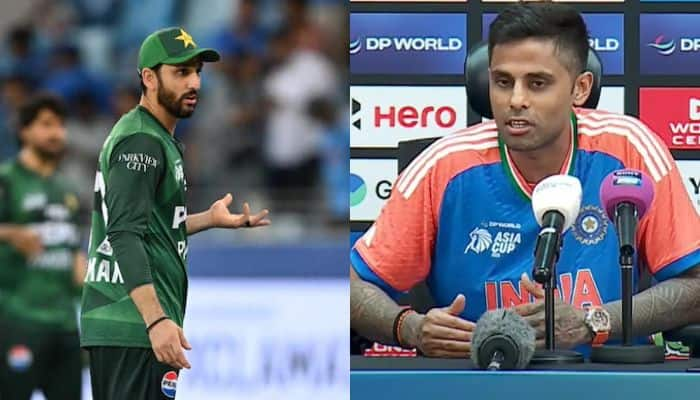The India vs Pakistan rivalry is never short of drama, but this time it went far beyond the cricketing field. After India’s emphatic seven-wicket victory over Pakistan in the Asia Cup 2025 group-stage match in Dubai, skipper Suryakumar Yadav made headlines not just for his match-winning knock but also for refusing the customary post-match handshake. The gesture, or rather the lack of it, has sparked heated debates about sportsmanship, politics, and national sentiment.
Well done, Team India! After thrashing Pakistan, the Indian team didn’t even come out to shake hands with the losing side, as is customary.
The best part: Captain Suryakumar Yadav expressed solidarity with the families of the victims of the Pahalgam terror attack. He dedicated… pic.twitter.com/MlAC8axCGa
— Amit Malviya (@amitmalviya) September 14, 2025
The Incident: No Handshake at the Toss or After the Match
At the toss, cricket fans noticed something unusual. Suryakumar Yadav and Pakistan captain Salman Ali Agha did not shake hands, keeping a deliberate distance. The scene repeated itself at the end of the match when Pakistan players lined up along the boundary rope, expecting the routine post-match handshakes. Instead, the Indian team walked straight back to the dressing room.
Pakistan coach Mike Hesson later revealed that Salman Ali Agha skipped the post-match presentation as a direct reaction to the snub, calling it a “flow-on effect.” For Pakistan, the gesture stung just as much as the defeat.
Suryakumar Yadav’s Justification: “Few Things Are Ahead of Sportsman Spirit”
Addressing the media, Suryakumar Yadav defended the team’s decision, explaining that India’s stance was rooted in solidarity with the victims of the Pahalgam terror attack earlier this year, which claimed 26 lives, mostly tourists.
“Few things in life are ahead of sportsman spirit,” Yadav said. “We dedicate this win to the families of the victims and our brave armed forces who carried out Operation Sindoor. Our government, the BCCI, and the team were aligned on this decision. We came here to play the game, and I believe we gave a proper reply.”
The India captain’s statement underscored that the refusal to shake hands was not a spontaneous act but a pre-planned decision taken in consultation with national authorities.
Political Backdrop: Why India’s Gesture Was Symbolic
The handshake boycott cannot be seen in isolation. Bilateral cricket between India and Pakistan has been suspended since 2012 due to political tensions, and meetings are restricted to ICC and ACC tournaments.
After the Pahalgam terror attack in April 2025 and India’s retaliatory Operation Sindoor in May, several former cricketers and political voices had called for India to boycott Pakistan in the Asia Cup. While the Indian government allowed participation in multi-team tournaments, it remained firm on banning bilateral series. Against this charged backdrop, the decision to skip handshakes was a powerful symbolic message, resonating strongly with Indian fans.
Social Media Backlash and Suryakumar’s Response
Interestingly, Suryakumar himself had faced criticism a week earlier when he shook hands with Salman Ali Agha at the captains’ press conference. He was also seen greeting PCB chief Mohsin Naqvi, who doubles as Pakistan’s Interior Minister.
Aware of the backlash, Suryakumar said the team deliberately cut down on social media engagement during the tournament.
“We decided as a group to block out 70–80% of outside noise. That’s how we could stay focused and execute our plans,” the skipper explained.
On-Field Dominance: India Crush Pakistan by Seven Wickets
While the post-match handshake drama grabbed headlines, the cricket itself was one-sided. India chased down Pakistan’s target with ease, powered by Suryakumar Yadav’s unbeaten 47 runs, which included the winning stroke. Backed by a sharp bowling performance, India registered their second consecutive victory, securing the top spot in Group A of Asia Cup 2025.
With qualification for the Super 4 stage virtually sealed, India now look ahead to their final group match against Oman in Abu Dhabi on September 19.
Pakistan’s Disappointment and Cricket’s Dilemma
From Pakistan’s perspective, the lack of a handshake was a bitter pill. Coach Mike Hesson admitted the players were “disappointed” but stopped short of escalating the issue. “We wanted to shake hands, but they didn’t. Salman not attending the presentation was a reaction to what happened,” he said.
The episode highlights cricket’s unique role in India-Pakistan relations—where even simple gestures like a handshake carry heavy political weight.

